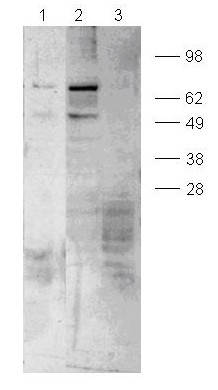ST1069 Sigma-AldrichPhosphoDetect™ Anti-Paxillin (pSer¹⁷⁸) Rabbit pAb
This PhosphoDetect™ Anti-Paxillin (pSer¹⁷⁸) Rabbit pAb is validated for use in Immunoblotting for the detection of Paxillin (pSer¹⁷⁸).
More>> This PhosphoDetect™ Anti-Paxillin (pSer¹⁷⁸) Rabbit pAb is validated for use in Immunoblotting for the detection of Paxillin (pSer¹⁷⁸). Less<<Recommended Products
Overview
| Replacement Information |
|---|
Key Spec Table
| Species Reactivity | Host | Antibody Type |
|---|---|---|
| H, M | Rb | Polyclonal Antibody |
| References | |
|---|---|
| References | Bellis, S.L., et al. 1997. Biochem. J. 325, 375. Schaller, M.D. 2001. Oncogene 20, 6459. Huang, C., et al. 2003. Nature 424, 219. |
| Product Information | |
|---|---|
| Form | Liquid |
| Formulation | In Tris-citrate/phosphate, pH 7.0-8.0. |
| Positive control | NIH3T3 cells plated on fibronectin |
| Preservative | ≤0.1% sodium azide |
| Quality Level | MQ100 |
| Physicochemical Information |
|---|
| Dimensions |
|---|
| Materials Information |
|---|
| Toxicological Information |
|---|
| Safety Information according to GHS |
|---|
| Safety Information |
|---|
| Product Usage Statements |
|---|
| Packaging Information |
|---|
| Transport Information |
|---|
| Supplemental Information |
|---|
| Specifications |
|---|
| Global Trade Item Number | |
|---|---|
| Catalogue Number | GTIN |
| ST1069 | 0 |
Documentation
PhosphoDetect™ Anti-Paxillin (pSer¹⁷⁸) Rabbit pAb Certificates of Analysis
| Title | Lot Number |
|---|---|
| ST1069 |
References
| Reference overview |
|---|
| Bellis, S.L., et al. 1997. Biochem. J. 325, 375. Schaller, M.D. 2001. Oncogene 20, 6459. Huang, C., et al. 2003. Nature 424, 219. |








